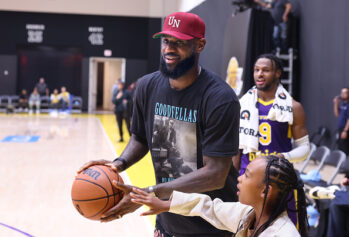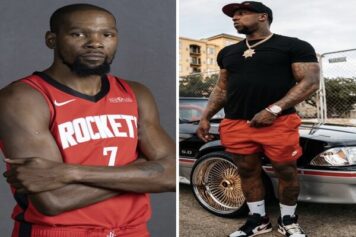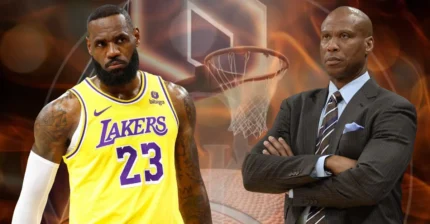Before the playoffs started, if asked to name the top five current point guards in the NBA, most would have probably mentioned some combination of Chris Paul, Stephen Curry, Russell Westbrook, Damian Lillard, John Wall, Kyrie Irving and Mike Conley. The very astute among us would have included LeBron James as well.
Right now, if asked to name the top ten point guards in NBA history, there’s no question that the first names that should come to mind would be Magic Johnson, LeBron, Oscar Roberston, Isiah Thomas, John Stockton and Walt Frazier. But what about that next tier? Lenny Wilkens? Gary Payton? Bob Cousy? Jason Kidd? Steve Nash?
The problem with those questions is that that we’ve been conditioned, for many reasons, to leave the one guy out who should, without hesitation, be included on both of those lists – the San Antonio Spurs’ Tony Parker.
About seven years ago, I watched him destroy Steve Nash, who was the reigning two-time NBA MVP and widely considered the league’s best point guard in the post-Stockton era, along with one of the top defenders in the league, Shawn Marion, during the Western Conference semifinals against the Phoenix Suns.
Right then and there, I made the assertion that Parker should be a perennial league MVP candidate and that he would one day be enshrined in the Hall of Fame, destined to go down as one of the best floor generals to ever play.
I’ll never forget the ensuing reaction from those I was debating with, all of whom looked at me like I was crazier than Buffalo Bill in Silence of the Lambs, or the astronaut lady who drove cross-country wearing a diaper.
But as Fidel Castro once said, I told them that history would absolve me.
Parker went on to be named the Finals MVP that year, when he dominated Boobie Gibson and Larry Hughes, who was an outstanding defensive player, as the Spurs swept the Cavaliers to capture his third NBA title. When he averaged a series-high 25 points per game while connecting on 57% of his shots, an absurd number for a diminutive point guard, I knew that, henceforth, it was on like some Garrett’s hot caramel popcorn.
In the aftermath of one of the most dominating performances by any team in NBA Finals history, where San Antonio expertly folded the Miami Heat like origami this year, it’s time to re-examine that discussion of Tony Parker’s place, not simply in today’s game, but in the larger historical context as well.
Because while everyone else is gesticulating about Tim Duncan’s legacy, which has long been secure as one of the greatest big men to ever play, and the emergence of Kawhi Leonard as the franchise’s next superstar, which was pretty evident to anyone paying attention during LAST YEAR’s playoffs, the true intellectual breakdown needs to center on Parker.
The first element of his career that stands out, despite the fact that European players had long established a presence on NBA rosters, is that Parker was THE first European point guard to ever elevate to a level of dominance.
The players who garnered the most respect were all big men and shooters like Detlef Schrempf, Marc and Pau Gasol, Vlade Divac, Peja Stojacovic, Dirk Nowitzki, Andrei Kirilenko, Toni Kukoc, Arvydas Sabonis, and my personal favorite, Drazen Petrovic.
Most people know that his father was from Chicago and played pro ball overseas. But Tony’s first love, growing up in France, was soccer. When you watch his change of direction, speed, his ability to initiate and absorb the contact within the subtle confines of the game’s hidden combat, it’s easy to see how playing on the pitch influenced his stylistic interpretation of the game.
The scars on his face are a testament to his toughness, a ruggedness and fearlessness that was evident at an early age – the bite mark on his cheek that he received while wrestling a dog at the age of three, and the blemish on his eyebrows that he attained when he fell down a flight of stairs at the age of four.
When he was thirteen years old in 1995, hanging out with his dad in Chicago during the winter, Parker witnessed something that would forever alter his life’s trajectory. He went to the United Center to watch the Bulls play, and fell under the hypnotic trance of Michael Jordan’s dominant excellence.
One year later, Parker enrolled in Paris’ National Institute of Sports and Education. In the same way that gifted teenage dancers, actors and musicians perfect their craft at New York’s High School for Performing Arts, the school known as INSEP trains and molds France’s most promising and talented young athletes. Other students enrolled at the time included his current Spurs teammate Boris Diaw and NBA veteran Ronny Turiaf, who plays for the Minnesota Timberwolves.
When he was merely 15 years old, Parker was dancing into the lane on French pros like Leroy from Fame.
His former coach on the French Junior National Team, Pierre Vincent, told the New York Times in 2003, prior to Parker’s first appearance in the NBA Finals against Jason Kidd and the New Jersey Nets, “At the championships, he was the best player even though he was two years younger than most of the others. I think what made him so special is that he has the best of both cultures, American and French. Because of his father he is thinking he can win no matter who he plays against, but he also wants to win for the team more than himself…He listens, he understands, always. Now people tell me, ‘It is incredible what he is doing.' I tell them, 'No, it is not incredible if you have known Tony…’”
I remember first hearing about Parker when he was 18 years old. A good friend and basketball mentor who was well-versed and educated in the international game, told me what he saw at the 2000 Nike Hoop Summit in Indianapolis, where Parker cooked a roster of celebrated American high school prospects to the tune of 20 points, seven rebounds and four assists.
Parker considered leaving INSEP to play at the legendary Oak Hill Academy program in Virginia, and later entertained scholarship offers from schools like Georgia Tech and UCLA. But due to the uncertainty of what the NCAA might have decided about his eligibility because he’d already been playing on a professional club, Parker, a skinny, frail-looking teenaged point guard from France, entered his name in the 2001 NBA Draft.
Taken with the 28th pick in the first round, Parker, only 19 years old, bumped Antonio Daniels to the bench by the fifth game of the season and became the Spurs starting point guard. No one that young had started at that highly-demanding and difficult position since Magic Johnson manned the point during his rookie campaign in the '79-'80 season.
Parker proceeded to become the first foreign-born guard to ever be named to the All-NBA Rookie First Team.
By his second year, playing alongside Steve Kerr, Speedy Claxton and fellow youngster Manu Ginobili, Parker won his first ring, looking every bit the equal of his counterpart on the Nets, and one of the best to ever man the point guard position, Jason Kidd.
He won another ring in 2005 when the Spurs beat a team that was its reasonable facsimile at the time, the defending champion Detroit Pistons. Detroit boasted their own formidable combination of Rasheed Wallace, Chauncy Billups, Richard Hamilton, Ben Wallace and Tayshaun Prince, a unit that played some amazing team basketball and whose collective excellence was much more than the individual sum of their parts would suggest.
After winning his third title with his MVP performance against LeBron’s Cadavaliers in 2007, Parker has gone on to assemble a resume that stands up against the best of the best. He’s the Spurs all-time career leader in assists. He’s had 50-point scoring games. He once scorched for 31 points in the first half of a playoff game. He’s put up triple-doubles. Last year, he handed out more assists than welfare when he dished out 18 against the Grizzlies in the Western Conference Finals.
His tear drop is unstoppable. He’s still one of the fastest and craftiest players in the league off the dribble and in the open court. Contrary to the sporadic brilliance of Kawhi Leonard, Tim Duncan and Manu Ginobili over the last few years, Parker has been the franchise’s best, most efficient and dependable player. The offense begins and ends with him. He is the lead foot on the Spurs’ accelerator, initiating their precise, economical and surgical offense.
The Spurs are fantastic at integrating that extra pass in an offensive attack that swarms and wobbles even the best defenses, similar to how Antonio Tarver stretched out Roy Jones, Jr. in their 2004 fight. At first glance, they don’t look fancy. But fall asleep at your own peril, because the knockout is coming.
Despite often being the smallest player on the court, Tony Parker consistently astounds with his ability to score buckets in the paint. This year, he surpassed Michael Jordan on the All-Time career postseason assists list, and Scottie Pippen on the All-Time career postseason scoring list.
He is the engine that powers the Spurs machine.
“When there is talk about the best point guards, sometimes they don't talk about me,” Parker said in 2007. “But that's not my main motivation. They can talk about Jason Kidd, Steve Nash, Deron Williams and Chris Paul. I still have the most rings.”
On Sunday night, he added his fourth ring. That’s four more than the current collection that Paul, Curry, Westbrook, Lillard, Wall, Irving and Conley have. To me, as amazing as Chris Paul is, and as sexy a skill-set that Westbrook, Curry and Lillard possess, the NBA’s best point guard not named LeBron James, and the best player on the best team in the world, is and has been Tony Parker for quite some time now.
And as far as putting things in a larger context, he’s already bumped Steve Nash or Bob Cousy out of the All-Time top ten players at the position discussion, as far as I’m concerned.
That’s right, I said it!!!
Tony Parker is one of the ten best point guards to ever play the game.
So go on ahead, feel free to think I’m crazier than Jack Nicholson in The Shining, or Joe Jackson when Michael and Marlon left the towel in tyhe swimming pool. I’m not worried.
Because history, and Tony Parker, as they've already been proven, will eventually absolve me. Maybe one day soon, he will get the recognition that he truly deserves.



